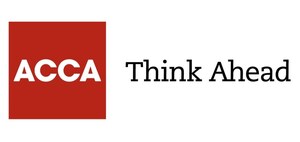As Artificial Intelligence (AI) becomes more mainstream, environmental, social and governance (ESG) considerations are a key part of ensuring responsible adoption
While potentially offering tremendous benefit, the broad applicability of AI across society must be handled carefully and professional accountants have a key role to play.
NEW YORK and LONDON, Aug. 19, 2021 /PRNewswire/ -- ACCA (the Association of Chartered Certified Accountants) and Chartered Accountants Australia and New Zealand (CA ANZ) reveal in a new report the pressing need for the accountancy profession to make the necessary connections between Artificial Intelligence (AI) and its relationship to environmental, social and governance (ESG) dimensions.
Polling over 5,700 respondents, including an expert panel of ACCA members across North America, the research reveals a global cautious tone, with fewer than half (43%) believing that the impact of AI on their rights as an individual is positive – such as safety and personal security, levels of fairness, levels of choice, levels of transparency. In North America, 30% of respondents believe this to be the case.
Feedback from North American respondents also reveals:
- A considerable 82% believe that their leaders prioritize ethics as highly as profits – compared with 66% globally.
- 70% believe that the impact of AI on overall standard of living in society is positive – compared to 64% globally.
- However, just 13% of their organization has implemented an ethical framework for AI use.
- And 44% of respondents have a basic understanding of what an algorithm is.
ACCA and CA ANZ say in Ethics for sustainable AI adoption: Connecting AI and ESG that professional accountants, with their explicit and long-standing commitment to ethical practices, are well placed to guide organizations along a responsible path for AI adoption.
Jillian Couse, head of ACCA North America says: "Our findings present a wake-up call for the accountancy profession to lead the way and become the super connectors needed to ensure an ethical approach. Their management of the transition to mass usage of AI in an ethical, responsible manner is essential if sustainable long-term value is to be secured from it."
The report's nine recommendations include the need to set tone at the top on AI adoption by prioritising an approach that is consistent with organizational values such as diversity and inclusion in considering the impact of AI on under-represented groups, or fairness when it comes to recruitment or surveillance of employees; and transparency such as appropriately disclosing AI use to customers.
Another recommendation for the profession is to challenge greenwashing and seek insights from AI tools to help with professional skepticism in examining whether the organization's claims about sustainability, such as on achieving net zero targets, are matched by its performance. Suspect claims need to be challenged.
Speaking of the global picture, Helen Brand, chief executive of ACCA says: 'AI adoption must consider the needs of all, especially the under-represented and vulnerable in society. That's why one of our recommendations is to ensure the profession exercises its professional judgement, because AI may create previously unseen situations. We recommend that professional accountants need to avoid over-reliance on simplistic checklist-based approaches which don't give the full picture or leave space for unintended consequences.'
Also commenting on the global findings, Ainslie van Onselen, chief executive of CA ANZ adds: 'Our report found that in order to ethically and sustainably adopt AI, organizations need effective governance mechanisms. This starts with setting the right tone and culture at the top and covers a range of areas from oversight and delivery procedures, to regulation and data governance. AI is a strategic endeavour that should be spearheaded by leaders who know and execute on the difference between what we have a right to do and what is the right thing to do. It's important to build knowledge and skills at the intersection of AI, ethics and sustainable development. This aligns well to the accountancy profession which can play a key role in driving responsible adoption.'
The global accountancy profession is bound by the Code of Ethics (the 'Code') and its five fundamental principles as set out by the International Ethics Standards Board for Accountants (IESBA). These are integrity, objectivity, professional competence and due care, confidentiality, and professional behavior.
Ethics for sustainable AI adoption: Connecting AI and ESG can be downloaded here: https://www.accaglobal.com/gb/en/professional-insights/technology/ai_ethics.html
About ACCA
ACCA (the Association of Chartered Certified Accountants) is the global professional body for professional accountants.
We're a thriving global community of 233,000 members and 536,000 future members based in 178 countries and regions, who work across a wide range of sectors and industries. We uphold the highest professional and ethical values.
We offer everyone everywhere the opportunity to experience a rewarding career in accountancy, finance and management. Our qualifications and learning opportunities develop strategic business leaders, forward-thinking professionals with the financial, business and digital expertise essential for the creation of sustainable organizations and flourishing societies.
Since 1904, being a force for public good has been embedded in our purpose. We believe that accountancy is a cornerstone profession of society and is vital helping economies, organizations and individuals to grow and prosper. It does this by creating robust trusted financial and business management, combating corruption, ensuring organizations are managed ethically, driving sustainability, and providing rewarding career opportunities.
And through our cutting-edge research, we lead the profession by answering today's questions and preparing for the future. We're a not-for-profit organization. Find out more at accaglobal.com
About CA ANZ
Chartered Accountants Australia and New Zealand (CA ANZ) represents more than 128,000 financial professionals, supporting them to make a difference to the businesses, organizations and communities in which they work and live. Chartered Accountants are known as Difference Makers. The depth and breadth of their expertise helps them to see the big picture and chart the best course of action. Find out more: https://www.charteredaccountantsanz.com/about-us
SOURCE ACCA (the Association of Chartered Certified Accountants)
Related Links
WANT YOUR COMPANY'S NEWS FEATURED ON PRNEWSWIRE.COM?
Newsrooms &
Influencers
Digital Media
Outlets
Journalists
Opted In





Share this article